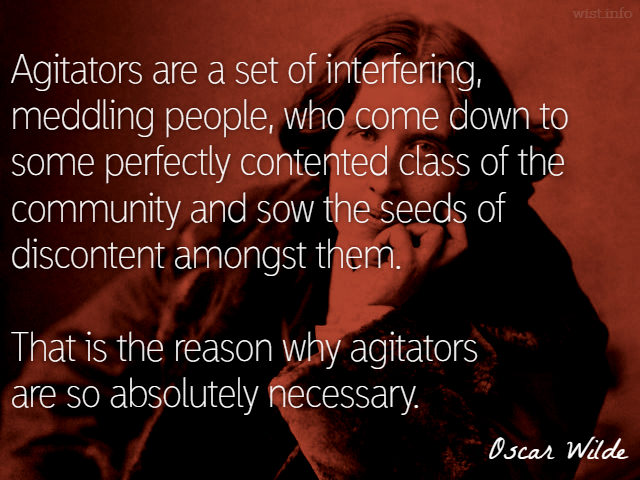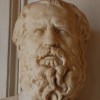THE DOCTOR: Oh, I always like to do the unexpected. Takes people by surprise.
Robert Holmes (1926-1986) British television screenwriter
Doctor Who (1963), 23×01 “The Trial of a Time Lord: The Mysterious Planet,” Part 1 (1985-01-05)
(Source)
(Source (Video)).
A number of sources start the second sentence with "It takes," which is not supported by the video.
Numbering for the story/serial within the season is controversial. Season 23 consisted of 14 episodes ("Part One" through "Part Fourteen") under the title "The Trial of a Time Lord." In turn, there were four distinct segments directed/written by different individuals, which were then separately novelized under new names (in this case, "The Mysterious Planet").
Quotations about:
chaos
Note not all quotations have been tagged, so Search may find additional quotes on this topic.
There’s no such thing as a humdrum life; to the person living it, it’s all peaks and abysses.
Mignon McLaughlin (1913-1983) American journalist and author
The Second Neurotic’s Notebook, ch. 4 (1966)
(Source)
The world is a higgledy-piggledy place, containing things pleasant and things unpleasant in haphazard sequence. And the desire to make an intelligible system or pattern out of it is at bottom an outcome of fear, in fact a kind of agoraphobia or dread of open spaces. Within the four walls of his library the timid student feels safe. If he can persuade himself that the universe is equally tidy, he can feel almost equally safe when he has to venture forth into the streets.
Bertrand Russell (1872-1970) English mathematician and philosopher
Conquest of Happiness, Part 2, ch. 12 “Affection” (1930)
(Source)
Brothers shall fight
and fell each other,
And sisters’ sons
shall kinship stain;
Hard is it on earth,
with mighty whoredom;
Axe-time, sword-time,
shields are sundered,
Wind-time, wolf-time,
ere the world falls;
Nor ever shall
each other spare.[Brœðr munu berjask
ok at bǫnum verða,
munu systrungar
sifjum spilla;
hart er í heimi,
hórdómr mikill;
skeggǫld, skálmǫld
— skildir ru klofnir —
vindǫld, vargǫld,
áðr verǫld steypisk;
mun engi maðr
ǫðrum þyrma.]Poetic Edda (800-1100) Old Norse anonymous collection of poems
Völuspá [Prophecy of the Völva; Prophecy of the Seeress], st. 45 (AD 961) [tr. Bellows (1936)]
(Source)
The time of Ragnarok. Narrated by Heiðr.
(Source (Old Norse)). Other translations:Brethren will fight and slay each other;
Kindred will spurn their consanguinity;
Hard will be the world:
Many the adulteries.
A bearded age: an age of swords:
Shields will be cloven.
An age of winds; an age of wolves.
Till the world shall perish
There will not be one that will spare another.
[tr. Turner (1836), st. 44]Brothers shall fight, and slay each other; cousins shall kinship violate. The earth resounds, the giantesses flee; no man will another spare.
Hard is it in the world, great whoredom, an axe age, a sword age, shields shall be cloven, a wind age, a wolf age, ere the world sinks.
[tr. Thorpe (1866)]; st. 45-46]Brother will fight brother and be his slayer,
sister's sons will violate the kinship-bond;
hard it is in the world, whoredom abounds,
axe-age, sword-age, shields are cleft asunder,
wind-age, wolf-age, before the world plunges headlong
no man will spare another.
[tr. Larrington (2014), st. 45]Brothers will battle and slay each other,
cousins will break the bonds of kin;
it’s harsh in the world, great whoredom,
axe-age, sword-age -- shields are cloven --
wind-age, wolf-age, before the world collapses;
no one will show mercy to another.
[tr. Pettit (2023); st. 44]
During seasons of great pestilence, men have often believed the prophecies of crazed fanatics, that the end of the world was come. Credulity is always greatest in times of calamity.
Charles Mackay (1814-1889) Scottish poet, journalist, song writer
Memoirs of Extraordinary Popular Delusions and the Madness of Crowds, “Modern Prophecies” (1841)
(Source)
CALVIN: Some people are pragmatists, taking things as they come and making the best of the choices available. Some people are idealists, standing for principle and refusing to compromise. And some people just act on any whim that enters their head.
HOBBES: I wonder which you are.
CALVIN: I pragmatically turn my whims into principles!
CONSTABLE: Disorder, that hath spoiled us, friend us now.
Let us on heaps go offer up our lives.ORLÉANS: We are enough yet living in the field
To smother up the English in our throngs,
If any order might be thought upon.BOURBON: The devil take order now! I’ll to the throng.
Let life be short, else shame will be too long.William Shakespeare (1564-1616) English dramatist and poet
Henry V, Act 4, sc. 5, l. 19ff (4.5.19-25) (1599)
(Source)
The French dealing with the disastrous rout of their initial attack at Agincourt.
MME. PERNELLE:This house appalls me. No one in it
Will pay attention for a single minute.
Children, I take my leave much vexed in spirit.
I offer good advice, but you won’t hear it.
You all break in and chatter on and on.
It’s like a madhouse with the keeper gone.[C’est que je ne puis voir tout ce ménage-ci,
Et que de me complaire on ne prend nul souci.
Oui, je sors de chez vous fort mal édifiée:
Dans toutes mes leçons j’y suis contrariée.
On n’y respecte rien, chacun y parle haut.
Et c’est tout justement la cour du roi Pétaud]Molière (1622-1673) French playwright, actor [stage name for Jean-Baptiste Poquelin]
Tartuffe, or the Hypocrite [Le Tartuffe, ou L’Imposteur], Act 1, sc. 1 (1669) [tr. Wilbur (1963)]
(Source)
Explaining to her daughter-in-law Elmire why she cutting short a visit to son, Orgon's, house.
Pétaud was the name supposedly given by groups of beggars in Medieval France to their chief (perhaps from the Latin peto, "I ask"), thus King Pétaud's "court" was a French metaphor of the time for a place of mad unruliness. Some translators carry over the name (footnoted); others come up with a different phrase that would be understood by English-speaking audiences.
(Source (French)). Alternate translations:I can't endure to see such Management, and no body takes any Care to please me. I leave your House, I tell you, very ill edify'd; my Instructions are all contradicted: you shew no respect for any thing amongst you, every one talks aloud there, and the House is a perfect Dover-Court.
[tr. Clitandre (1672)]I cannot bear to see such goings on. No one cares to please me. I leave your house very little edified: all my advice is despised; nothing is respected, every one has his say aloud, and and it is just like the court of King Pétaud.
[tr. Van Laun (1876)]I cannot bear to see what goes on in your house, and that no effort is made to comply with my wishes. Yes, I leave your house very ill edified. Things are done against all my admonitions; there is no respect paid to anything; everyone speaks out as he likes, and it is exactly like the court of King Petaud.
[tr. Wall (1879)]I cannot bear to see such goings on. No one takes any pains to please me. I leave your house, I tell you, very much shocked: all my teaching is contradicted. You have no regard for anything; every one talks at the top of his voice, and the place is a perfect Bedlam.
[tr. Mathew (1890)]I cannot bear to see such goings on and no one takes any pains to meet my wishes. Yes, I leave your house not very well pleased: you ignore all my advice, you do not show any respect for anything, everyone says what he likes, and it is just like the Court of King Pétaud.
[tr. Waller (1903)]I can't endure your carryings-on,
And no one takes the slightest pains to please me.
I leave your house, I tell you, quite disgusted;
You do the opposite of my instructions;
You've no respect for anything; each one
Must have his say; it's perfect pandemonium.
[tr. Page (1909)]I can't stand the way that things are going!
In my son's house they pay no heed to me.
I am not edified; not edified.
I give you good advice. Who pays attention?
Everyone speaks his mind, none shows respect.
This place is Bedlam; everyone is king here.
[tr. Bishop (1957)]I can’t abide the goings-on in there,
And no one in the household seems to care.
Yes, child, I’m leaving you, unedified,
My good advice ignored, if not defied.
Everyone speaks right out on everything:
It’s like a court in which Misrule is king.
[tr. Frame (1967)]I'm horrified by all of you.
I'm leaving in extreme distress,
I've never liked a household less.
Who listens to a word I say?
Or does the smallest thing my way?
It's more than I have strength to bear.
This chaos drives me to despair!
When will you people ever learn
To hold your tongues, or speak in turn,
Respecting person, time, and place?
Your slipshod ways are a disgrace!
[tr. Bolt (2002)]I cannot stand the way this household is run. No one ever makes any effort to please me. Yes, I am leaving. I've seen some shocking behavior: my instructions are rejected; no one respects me; everyohne speaks arrogantly -- it's Bedlam here.
[tr. Steiner (2008)]I simply cannot bear the way you do things here,
Nobody has a thought for me.
I'm leaving you in a state of very considerable displeasure:
All my advice is ignored,
There's no respect and everyone talks back,
In short, the whole place is an absolute shambles.
[tr. Campbell (2013)]
Unity, like so many good things, is good only in moderation. The same can be said of disunity.
Jane Jacobs (1916-2006) American-Canadian journalist, author, urban theorist, activist
Dark Age Ahead, ch. 1 “The Hazard” (2004)
(Source)
Others lash the unknown seas with oars,
Rush at the sword, pay court in royal halls.
One destroys a city and its homes
To drink from jewelled cups and sleep on scarlet;
One hoards his wealth and lies on buried gold.
One gapes dumbfounded at the speaker’s stand;
At the theater, still another, open-mouthed,
Reels before crescendos of applause
From the tiers where mob and dignitaries sit.
Others are keen to drench themselves in blood,
Their brothers’ blood, and, exiled, change their homes
And winsome hearths, to range abroad for room
To live in, underneath a foreign sun.[Sollicitant alii remis freta caeca ruuntque
in ferrum, penetrant aulas et limina regum;
hic petit excidiis urbem miserosque Penatis,
ut gemma bibat et Sarrano dormiat ostro;
condit opes alius defossoque incubat auro;
hic stupet attonitus rostris; hunc plausus hiantem
per cuneos — geminatus enim plebisque patrumque —
corripuit; gaudent perfusi sanguine fratrum,
exsilioque domos et dulcia limina mutant
atque alio patriam quaerunt sub sole iacentem.]Virgil (70-19 BC) Roman poet [b. Publius Vergilius Maro; also Vergil]
Georgics [Georgica], Book 2, l. 504ff (2.504-513) (29 BC) [tr. Bovie (1956)]
(Source)
Virgil contrasting violent, ambitious, vain, and rootless life of city folk (evoking the Roman civil wars), in contrast to the bucolic peace and sense of home enjoyed by farmers.
(Source (Latin)). Alternate translations:Some vex the Sea, and some to war resorts,
Attend on Kings, and waite in Princes Courts.
This would his Countrey, and his God betray
To drink in Jems, and on proud scarlet lye.
This hides his wealth, and broods on hidden gold,
This loves to plead, and that to be extold
Through all the seats of Commons, and the sires.
To bathe in's brothers blood this man desires.
Some banish'd, must their native seats exchange,
And Countries, under other Climates range.
[tr. Ogilby (1649)]Some to the Seas, and some to Camps resort,
And some with Impudence invade the Court.
In foreign Countries others seek Renown,
With Wars and Taxes others waste their own.
And Houses burn, and household Gods deface,
To drink in Bowls which glitt'ring Gems enchase:
To loll on Couches, rich with Cytron Steds,
And lay their guilty Limbs in Tyrian Beds.
This Wretch in Earth intombs his Golden Ore,
Hov'ring and brooding on his bury'd Store.
Some Patriot Fools to pop'lar Praise aspire,
By Publick Speeches, which worse Fools admire.
While from both Benches, with redoubl'd Sounds,
Th' Applause of Lords and Commoners abounds.
Some through Ambition, or thro' Thirst of Gold;
Have slain their Brothers, or their Country sold:
And leaving their sweet Homes, in Exile run
To Lands that lye beneath another Sun.
[tr. Dryden (1709), l. 720ff]Some rush to battle, vex with oars the deep,
Or in the courts of Kings insidious creep;
For cups of gem, and quilts of Tyrian, die,
Others remorseless loose each public tie:
On hoarded treasures these ecstatic gaze,
Those eye the Rostra, stupid with amaze:
This for the theatre's applauding roar
Sighs: with the blood of brothers sprinkled o'er
From their dear homes to exile others run,
And seek new seats beneath a distant sun.
[tr. Nevile (1767), l. 565ff]Some vex with restless oar wild seas unknown.
Some rush on death, or cringe around the throne;
Stern warriors here beneath their footsteps tread
The realm that rear'd them, and the hearth that fed,
To quaff from gems, and lull to transient rest
The wound that bleeds beneath the Tyrian vest.
These brood with sleepless gaze o'er buried gold,
The rostrum these with raptur'd trance behold,
Or wonder when repeated plaudits raise
'Mid peopled theatres the shout of praise;
These with grim joy, by civil discord led,
And stain'd in battles where a brother bled.
From their sweet household hearth in exile roam,
And seek beneath new suns a foreign home.
[tr. Sotheby (1800)]Some vex the dangerous seas with oars, some rush into arms, some work their way into courts, and the palaces of kings. One destines a city and wretched families to destruction, that he may drink in gems and sleep on Tyrian purple. Another hoards up wealth, and broods over buried gold. One, astonished at the rostrum, grows giddy; another peals of applause along the rows, (for it is redoubled both by the people and the fathers,) have captivated, and set agape; some rejoice when stained with their brother's blood; and exchange their homes and sweet thresholds for exile, and seek a country lying under another sun.
[tr. Davidson (1854)]While others vex dark Hellespont with oars,
Leap on the sword, or dash through royal stores,
Storm towns and homesteads, in their vile desire
To quaff from pearl, and sleep on tints of Tyre;
While others hoard and brood on buried dross,
And some are moonstruck at the pleader's gloss;
While this man gapes along the pit, to hear
The mob and senators renew their cheer;
And others, reeking in fraternal gore,
With songs of triumph quit their native shore,
Abjure sweet home for banishment, and run
In quest of country 'neath another sun --
[tr. Blackmore (1871), l. 602ff]Others are startling the darkness of the deep with oars, rushing on the sword's pint, winning their way into the courts and ante-chambers of kings; another is dooming a city to ruin and its homes to misery, that he may drink from jewelled cups and sleep on Tyrian purple; another hoards his wealth, and broods o'er buried gold; this man is dazzled and amazed by the eloquence of the rostra; that man the applause of commoners and senators, as it rolls redoubled through the benches, transports agape with wonder; they steep their hands in brothers' blood and joy, they change their homes and the thresholds of affection for the land of exile, and seek a fatherland that lies beneath another sun.
[tr. Wilkins (1873)]Others vex
The darksome gulfs of Ocean with their oars,
Or rush on steel: they press within the courts
And doors of princes; one with havoc falls
Upon a city and its hapless hearths,
From gems to drink, on Tyrian rugs to lie;
This hoards his wealth and broods o'er buried gold;
One at the rostra stares in blank amaze;
One gaping sits transported by the cheers,
The answering cheers of plebs and senate rolled
Along the benches: bathed in brothers' blood
Men revel, and, all delights of hearth and home
For exile changing, a new country seek
Beneath an alien sun.
[tr. Rhoades (1881)]These dare the ocean, and invite the storm,
This rage, and this the courtier’s wiles deform;
All faith, all right the traitor’s acts defy,
From gems to drink, on Tyrian purple lie;
One broods in misery o’er his hoarded gold.
And one in chains the people’s plaudits hold.
There stains of blood pollute a brother’s hand,
And he in terror flies his father’s land.
[tr. King (1882), l. 514ff]Some vex the dangerous seas with oars, or rush into arms, or work their way into courts and the palaces of kings: one marks out a city and its wretched homes for destruction, that he may drink from jewelled cups and sleep on Tyrian purple. Another hoards up wealth, and lies sleepless on his buried gold. One, in bewildered amazement, gazes at the Rostra; another, in open-mouthed delight, the plaudits of the commons and the nobles, redoubled along benches, have arrested: some take pleasure in being drenched with a brother’s blood; and exchange their homes and dear thresholds for exile, and seek a country lying under another sun.
[tr. Bryce (1897)]Others vex blind sea-ways with their oars, or rush upon the sword, pierce the courts and chambers of kings; one aims destruction at the city and her wretched homes, that he may drink from gems and sleep on Tyrian scarlet; another heaps up wealth and broods over buried gold; one hangs rapt in amaze before the Rostra; one the applause of populace and senate re-echoing again over the theatre carries open-mouthed away: joyfully they steep themselves in blood of their brethren, and exchange for exile the dear thresholds of their homes, and seek a country spread under an alien sun.
[tr. Mackail (1899)]Others may tempt with oars the printless sea, may fling
Their lives to the sword, may press through portals and halls of a king.
This traitor hath ruined his country, hath blasted her homes, thereby
To drink from a jewelled chalice, on Orient purple to lie;
That fool hoards up his wealth, and broods o'er his buried gold;
That simple-one gazes rapt on the rostra: the loud cheers rolled
Down the theatre-seats, as Fathers and people acclaiming stood,
Have entranced yon man; men drench them with joy in their brethren's blood;
Into exile from home and its sweet, sweet threshold some have gone
Seeking a country that lieth beneath an alien sun.
[tr. Way (1912), l. 503ff]Let strangers to such peace
Trouble with oars the boundless seas or fly
To wars, and plunder palaces of kings;
Make desolate whole cities, casting down
Their harmless gods and altars, that one's wine
May from carved rubies gush, and slumbering head
On Tyrian pillow lie. A man here hoards
His riches, dreaming of his buried gold;
Another on the rostrum's flattered pride
Stares awe-struck. Him th' applause of multitudes.
People and senators, when echoed shouts
Ring through the house approving, quite enslaves.
With civil slaughter and fraternal blood
One day such reek exultant, on the next
Lose evermore the long-loved hearth and home.
[tr. Williams (1915)]Others brave with oars seas unknown, dash upon the sword, or press their way into courts and the chambers of kings. One wreaks ruin on a city and its wretched homes, and all to drink from a jewelled cup and sleep on Tyrian purple; another hoards wealth and gloats over buried gold; one stares in admiration at the rostra; another, open-mouthed, is carried away by the applause of high and low which rolls again and again along the benches. They steep themselves in their brothers’ blood and glory in it; they barter their sweet homes and hearths for exile and seek a country that lies beneath an alien sun.
[tr. Fairclough (Loeb) (1916)]Other men dare the sea with their oars blindly, or dash
On the sword, or insinuate themselves into royal courts:
One ruins a whole town and the tenements of the poor
In his lust for jewelled cups, for scarlet linen to sleep on,
One piles up great wealth, gloats over his cache of gold;
One gawps at the public speakers; one is worked up to hysteria
By the plaudits of senate and people resounding across the benches:
These shed their brothers’ blood
Merrily, they barter for exile their homes beloved
And leave for countries lying under an alien sun.
[tr. Day-Lewis (1940)]Others churn blind straits with their oars, and rush to the sword, force their way across the thresholds and into the courts of kings; [...] They rejoice, soaked in their brothers’ blood, exchange their own sweet thresholds for exile and seek a fatherland under another sun.
[tr. Miles (1980)]Some vex with oars uncharted waters, some
Rush on cold steel, some seek to worm their way
Into the courts of kings. One is prepared
To plunge a city's homes in misery
All for a jewelled cup and a crimson bedspread;
Another broods on a buried hoard of gold.
This one is awestruck by the platform's thunder;
That one, enraptured, gapes ad the waves of applause
from high and low rolling across the theater.
Men revel steeped in brothers' blood, exchange
The hearth they love for banishment, and seek
A home in lands benath an alien sun.
[tr. Wilkinson (1982)]Others trouble unknown seas with oars, rush on
their swords, enter the gates and courts of kings.
This man destroys a city and its wretched houses,
to drink from a jewelled cup, and sleep on Tyrian purple:
that one heaps up wealth, and broods about buried gold:
one’s stupefied, astonished by the Rostra: another, gapes,
entranced by repeated applause, from people and princes,
along the benches: men delight in steeping themselves
in their brothers’ blood, changing sweet home and hearth for exile,
and seeking a country that lies under an alien sun.
[tr. Kline (2001)]Others slap their oars on dark, unknown seas, fall on their swords,
or thrust themselves into royal courts and palaces.
One man aims to destroy a city and its humble homes -- just
to drink from a jeweled goblet and sleep on Tyrian purple;
another stores up treasures and broods on his buried gold.
Wide-eyed, one gawks at the forum's speakers; another,
mouth agape, is swept away when lower class and upper both
applaud a statesman. Dripping with their brothers' gore,
they exult, exchanging familiar homes and hearths for exile,
they seek a fatherland that lies beneath a foreign sun.
[tr. Lembke (2004)]Others fret with oars uncharted seas, or rush
upon the sword, or infiltrate the courts and vestibules of kings.
One visits devastation on a city and its wretched hearths
that he may slurp from a jewelled cup and snore on Tyrian purple.
Another hoards treasure and broods over buried gold.
One wonders thunderstruck at the podium, one gapes
transported by the applause of senators and commonfolk
resounding through the galleries. Drenched in their brothers' blood
they exult, and trade exile for their homes and sweet porches,
and seek a homeland under an alien sun.
[tr. Johnson (2009)]There are those who with their oars disturb the waters
Of dangerous unknown seas, and those who rush
Against the sword, and those who insinuate
Their way into the chamber of a king:
There's one who brings down ruin on a city
And all its wretched households, in his desire
To drink from an ornate cup and go to sleep
On Tyrian purple coverlets at night;
There's the man who heaps up gold, and hides it away,
There's he who stares up stupefied at the Rostrum;
There's the open-mouthed, undone astonishment
Of the one who hears the waves and waves of the wild
Applause of the close packed crowd in the theater;
There are those who bathe in their brothers' blood, rejoicing;
And those who give up house and home for exile,
Seeking a land an alien sun shines on.
[tr. Ferry (2015)]
I feel that art has something to do with the achievement of stillness in the midst of chaos. A stillness that characterizes prayer, too, and the eye of the storm. I think that art has something to do with an arrest of attention in the midst of distraction.
The neurotic feels like a Christmas shopper who keeps dropping his packages, and it’s raining.
Mignon McLaughlin (1913-1983) American journalist and author
The Neurotic’s Notebook, ch. 5 (1963)
(Source)
You think that a wall as solid as the earth separates civilization from barbarism. I tell you the division is a thread, a sheet of glass. A touch here, a push there, and you bring back the reign of Saturn.
John Buchan (1875-1940) Scottish novelist, poet, and politician; Governor-General of Canada (1935 -1940)
The Power-House, ch. 3 (1916)
(Source)
History is a jangle of accidents, blunders, surprises and absurdities, and so is our knowledge of it, but if we are to report it at all we must impose some order upon it.
Henry Steele Commager (1902-1998) American historian, writer, activist
The Nature and the Study of History, ch. 5 (1965)
(Source)
The beginnings and endings of all human undertakings are untidy: the building of a house, the writing of a novel, the demolition of a bridge, and eminently, the finish of a voyage.
What is said by great employers of labor against agitators is unquestionably true. Agitators are a set of interfering, meddling people, who come down to some perfectly contented class of the community and sow the seeds of discontent amongst them. That is the reason why agitators are so absolutely necessary. Without them, in our incomplete state, there would be no advance towards civilization.
Oscar Wilde (1854-1900) Irish poet, wit, dramatist
“The Soul of Man Under Socialism” (1891)
(Source)
History unfortunately leaves some people oppressed and some people oppressors. And there are three ways that individuals who are oppressed can deal with their oppression. One of them is to rise up against their oppressors with physical violence and corroding hatred. But oh this isn’t the way. For the danger and the weakness of this method is its futility. Violence creates many more social problems than it solves. And I’ve said, in so many instances, that as the Negro, in particular, and colored peoples all over the world struggle for freedom, if they succumb to the temptation of using violence in their struggle, unborn generations will be the recipients of a long and desolate night of bitterness, and our chief legacy to the future will be an endless reign of meaningless chaos. Violence isn’t the way.
Martin Luther King, Jr. (1929-1968) American clergyman, civil rights leader, social activist, preacher
“Loving Your Enemies,” Sermon, Dexter Avenue Baptist Church, Montgomery (17 Nov 1957)
(Source)
In a book, all would have gone according to plan. … but life was so fucking untidy — what could you say for an existence where some of your most crucial conversations of your life took place when you needed to take a shit, or something? An existence where there weren’t even any chapters?
Music and silence — how I detest them both! How thankful we should be that ever since our Father entered Hell — though longer ago than humans, reckoning in light years, could express — no square inch of infernal space and no moment of infernal time has been surrendered to either of those abominable forces, but all has been occupied by Noise — Noise, the grand dynamism, the audible expression of all that is exultant, ruthless, and virile — Noise which alone defends us from silly qualms, despairing scruples, and impossible desires. We will make the whole universe a noise in the end. We have already made great strides in this direction as regards the Earth. The melodies and silences of Heaven will be shouted down in the end. But I admit we are not yet loud enough, or anything like it.
There must be either a predestined Necessity and inviolable plan, or a gracious Providence, or a chaos without design or director. If then there be an inevitable Necessity, why kick against the pricks? If a Providence that is ready to be gracious, render thyself worthy of divine succour. But if a chaos without guide, congratulate thyself that amid such a surging sea thou hast a guiding Reason.
[Ἤτοι ἀνάγκη εἱμαρμένης καὶ ἀπαράβατος τάξις ἢ πρόνοια ἱλάσιμος ἢ φυρμὸς εἰκαιότητος ἀπροστάτητος. εἰ μὲν οὖν ἀπαράβατος ἀνάγκη, τί ἀντιτείνεις; εἰ δὲ πρόνοια ἐπιδεχομένη τὸ ἱλάσκεσθαι, ἄξιον σαυτὸν ποίησον τῆς ἐκ τοῦ θείου βοηθείας. εἰ δὲ φυρμὸς ἀνηγεμόνευτος, ἀσμένιζε ὅτι ἐν τοιούτῳ κλύδωνι αὐτὸς ἔχεις ἐν σαυτῷ τινα νοῦν ἡγεμονικόν.]
Marcus Aurelius (AD 121-180) Roman emperor (161-180), Stoic philosopher
Meditations, Book 12, #14 [tr. Haines (1916)]
(Source)
Original Greek. Alternate translations:Either fate, (and that either an absolute necessity, and unavoidable decree; or a placable and flexible Providence) or all is a mere casual confusion, void of all order and government. If an absolute and unavoidable necessity, why doest thou resist? If a placable and exorable Providence, make thyself worthy of the divine help and assistance. If all be a mere confusion without any moderator, or governor, then hast thou reason to congratulate thyself; that in such a general flood of confusion thou thyself hast obtained a reasonable faculty, whereby thou mayest govern thine own life and actions.
[tr. Casaubon (1634), #11]Either the Order of Things are fixed by irrevocable Fate, or Providence may be worked into Compassion, or else the World Floats at Raondom without any Steerage. Now if nature lies under immovable Necessity, to what purpose should you struggle against it? If the favor of Providence is to be gained, qualify your self for the Divine Assistance: But if Chance, and Confusion carry it, and no body sits at the Helm; be you contented and Ride out the Storm patiently, for you have a Governor within you , though the World has none.
[tr. Collier (1701)]Either there is a fatal necessity and invincible order, or a kind providence, or a confusion without a purpose and without a director. If then there is an invincible necessity, why dost thou resist? But if there is a providence which allows itself to be propitiated, make thyself worthy of the help of the divinity. But if there is a confusion without a governor, be content that in such a tempest thou hast in thyself a certain ruling intelligence.
[tr. Long (1862)]Either the order of things is fixed by irrevocable fate, or providence may be worked into compassion, or else the world floats at random without any steerage. Now if nature lies under an immovable necessity, to what purpose should you struggle against it? If the favor of providence is to be gained, qualify yourself for divine assistance; but if chance and confusion prevail, be you contented that in such a storm you have a governing intelligence within you.
[tr. Zimmern (1887)]Either the Necessity of destiny and an order none may transgress, or Providence that hears intercession, or an ungoverned welter without a purpose. If then a Necessity which none may transgress, why do you resist? If a Providence admitting intercession, make yourself worthy of assistance from the Godhead. If an undirected welter, be glad that in so great a flood of waves you have yourself within you a directing mind.
[tr. Farquharson (1944)]Fatal necessity, and inescapable order. Or benevolent Providence. Or confusion -- random and undirected. If it's an inescapable necessity, why resist it? If it's Providence, admits of being worshipped, then try to be worthy of God's aid. If it's confusion and anarchy, then be grateful that on this raging sea you have a mind to guide you.
[tr. Hays (2003)]Either predetermined necessity and unalterable cosmic order, or a gracious providence, or a chaotic ungoverned mixture. If a predetermined necessity, why do you resist? If it is a gracious Providence that can hear our prayers, then make yourself worthy of divine assistance. If a chaotic ungoverned mixture, be satisfied that in the midst of this storm, you have within yourself a mind whose nature it is to govern and command.
[tr. Needleman/Piazza (2008)]
[T]imid men […] prefer the calm of despotism to the boisterous sea of liberty.
Thomas Jefferson (1743-1826) American political philosopher, polymath, statesman, US President (1801-09)
Letter (1796-04-24) to Philip Mazzei
(Source)
All things are in motion, and nothing is at rest. … You cannot step into the same [river] twice, for fresh waters are ever flowing in upon you.
[Πάντα ῥεῖ καὶ οὐδὲν μένει]
Heraclitus of Ephesus (c.540-c.480 BC) Greek philosopher [Ἡράκλειτος, Herákleitos, Heracleitus]
(Attributed)
Paraphrased by Socrates in Plato, Cratylus, l. 402 [tr. B Jowett (1894)] and by Diogenes Laërtius in Lives of the Philosophers Bk 9, sec 8
Alt trans.:
- Everything flows, nothing stays still
- Everything flows and nothing stays.
- Everything flows and nothing abides.
- Everything gives way and nothing stays fixed.
- Everything flows; nothing remains.
- All is flux, nothing is stationary.
- All is flux, nothing stays still.
- You cannot step twice into the same river; for other waters are continually flowing in.
- You cannot step twice into the same stream. For as you are stepping in, other waters are ever flowing on to you.
- You cannot step twice into the same river.
- It is impossible to step into the same river twice.
- No man ever steps in the same river twice, for it's not the same river and he's not the same man.
Most of us lead lives of chaotic improvisation from day to day, bawling for peace while plunging grimly into fresh disorders.
Edward Abbey (1927-1989) American anarchist, writer, environmentalist
A Voice Crying in the Wilderness (1991)
(Source)
Whatsoever therefore is consequent to a time of Warre, where every man is Enemy to every man; the same is consequent to the time, wherein men live without other security, than what their own strength, and their own invention shall furnish them withall. In such condition, there is no place for Industry; because the fruit thereof is uncertain; and consequently no Culture of the Earth; no Navigation, nor use of the commodities that may be imported by Sea; no commodious Building; no Instruments of moving, and removing such things as require much force; no Knowledge of the face of the Earth; no account of Time; no Arts; no Letters; no Society; and which is worst of all, continuall feare, and danger of violent death; And the life of man, solitary, poore, nasty, brutish, and short.
Turning and turning in the widening gyre
The falcon cannot hear the falconer;
Things fall apart; the centre cannot hold;
Mere anarchy is loosed upon the world,
The blood-dimmed tide is loosed, and everywhere
The ceremony of innocence is drowned;
The best lack all conviction, while the worst
Are full of passionate intensity.William Butler Yeats (1865-1939) Irish poet and dramatist
“The Second Coming,” ll.1-8 (1920)
(Source)
More examination of this quotation: The Best Lack All Conviction While the Worst Are Full of Passionate Intensity – Quote Investigator. See also Russell and Bukowski.

































